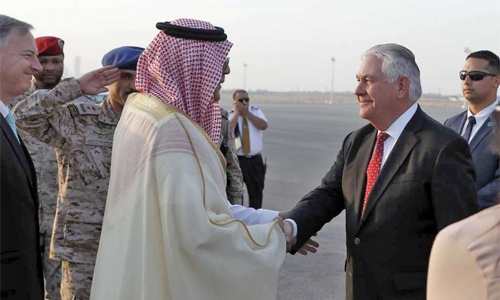Tillerson lands in Riyadh at start of Gulf, South Asia tour
Riyadh : US Secretary of State Rex Tillerson arrived in Riyadh yesterday to attend a landmark meeting between officials from Saudi Arabia and Iraq aimed at improving relations between the two countries and countering Iran’s growing regional influence.
The chief U.S. diplomat flew into King Salman Air Base a little more than a week after U.S. President Donald Trump unveiled a strategy to contain Iran and compel Tehran to agree to close what he charged are flaws in the multinational 2015 deal designed to prevent Iran developing nuclear weapons.
Tillerson’s only official meeting yesterday was a working dinner with Saudi Foreign Minister Adel al-Jubeir. He was stopping in Saudi Arabia on the first leg of a six-day trip that will also take him to Qatar, Pakistan, India and Switzerland.
His talks in Saudi Arabia and in Qatar were expected to be dominated by the topic of Iran’s growing regional influence.
Iran-backed militias have helped turn the tide of Syria’s civil war in the government’s favour and they have played leading roles in Iraq’s battle to recapture Islamic State’s self-declared “caliphate.”
This week, they aided Iraqi security forces in seizing the oil-rich area of the northern city of Kirkuk as part of an effort to crush a bid for independence made by the Kurdish minority.
Washington and Riyadh also allege that Iran is supporting Houthi rebels in Yemen against pro-government forces that are supported by a Saudi-led military coalition backed by the United States. Yemen’s grinding civil war was expected to be high on Tillerson’s agenda.
On Sunday Tillerson is due to attend the inaugural session of the Saudi-Iraqi Coordination Council, a body whose creation was promoted by the Trump administration to bolster relations between Saudi Arabia, Iran’s main regional rival, and Iraq, whose majority Shiite-dominated government has close ties with Tehran.
During his visit Tillerson is also expected to explore the possibility of renewing a push to end a diplomatic and economic boycott of Qatar by Saudi Arabia and other U.S. Arab allies, although he has conceded he is not optimistic.
Related Posts

